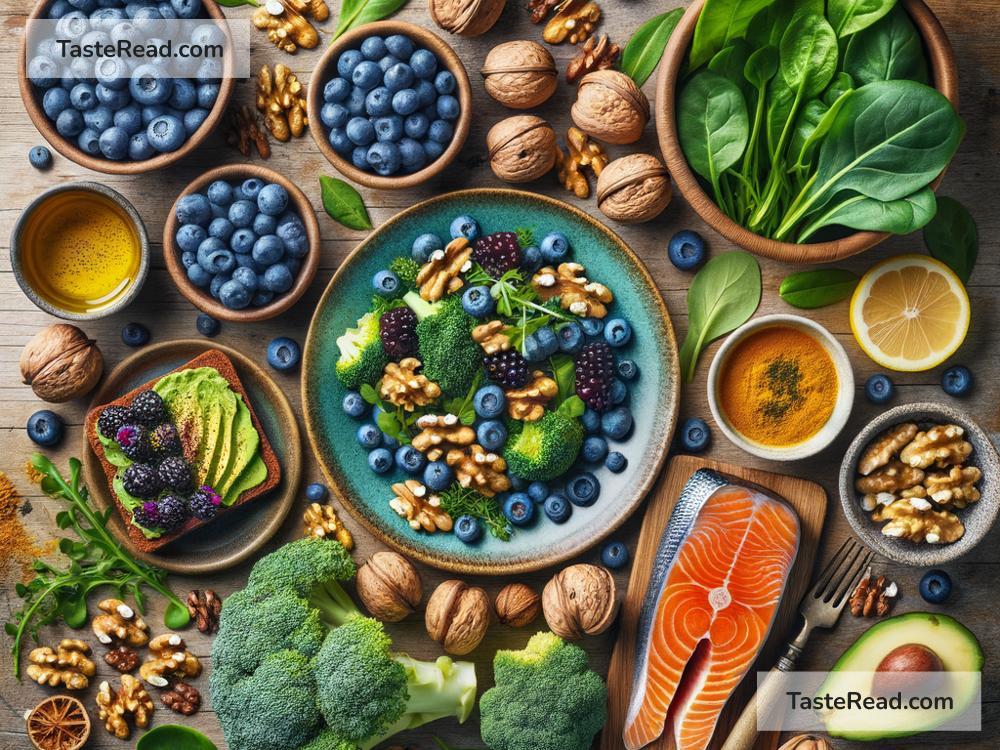Foods That Help Reduce Neurodegeneration: Supporting Brain Health Naturally
Neurodegeneration is a serious issue that affects millions of people worldwide. Conditions like Alzheimer’s disease, Parkinson’s disease, and other forms of cognitive decline are linked to the brain’s deterioration over time. While some factors that contribute to neurodegeneration are beyond our control, such as genetics or aging, research shows that certain lifestyle choices can help protect brain health. One of the most important factors is what we eat. Some foods contain nutrients that help reduce inflammation, fight oxidative stress, and support brain function, which in turn may lower the risk of neurodegeneration. In this article, we’ll explore some of the best foods for maintaining a healthy brain—using simple language everyone can understand.
1. Fatty Fish
Fish like salmon, mackerel, trout, and sardines are rich in omega-3 fatty acids. Omega-3s are healthy fats that play a major role in brain health. They help build cell membranes in the brain and can reduce inflammation, which is linked to neurodegeneration. Studies suggest that omega-3s may slow cognitive decline and reduce the risk of conditions like Alzheimer’s disease. If you’re not a fan of fish, you can also get omega-3s from walnuts, chia seeds, flaxseeds, or omega-3 supplements.
2. Blueberries
Blueberries are often called “brain berries” for a good reason. They are packed with antioxidants, especially flavonoids, which help protect the brain from damage caused by oxidative stress. Oxidative stress happens when harmful substances called free radicals damage cells. Over time, this damage can lead to neurodegeneration. Eating blueberries regularly may improve memory and slow age-related brain decline. Other berries like strawberries and blackberries are also great for brain health.
3. Leafy Greens
Vegetables like spinach, kale, and broccoli are full of vitamins, minerals, and antioxidants that support brain function. They are especially high in vitamin K, folate, and beta-carotene, which are known to help improve memory and slow cognitive decline. Leafy greens also contain compounds that help reduce inflammation in the brain. Adding a serving of these veggies to your daily meals can make a big difference over time.
4. Nuts and Seeds
Nuts and seeds are another food group that supports brain health. Walnuts, in particular, are famous for their high levels of omega-3s and antioxidants. Almonds, sunflower seeds, and pumpkin seeds are also rich in nutrients like vitamin E, which protects the brain from oxidative stress. Snacking on a handful of nuts or seeds every day can benefit your brain while keeping you satisfied between meals.
5. Turmeric
Turmeric is a yellow spice commonly used in Indian cooking, and it has powerful brain-protective benefits. Its active ingredient, curcumin, has strong anti-inflammatory and antioxidant properties. Curcumin may help reduce the buildup of harmful protein plaques in the brain, which are linked to Alzheimer’s disease. Studies suggest that turmeric may also improve mood and help new brain cells form. Adding a sprinkle of turmeric to your recipes or drinking turmeric tea is a simple way to protect your brain.
6. Whole Grains
Whole grains like oats, quinoa, brown rice, and whole wheat are excellent for brain health. They are rich in fiber, which helps stabilize blood sugar levels and improve energy flow to the brain. Whole grains also contain important nutrients like magnesium, which reduces inflammation, and vitamin B6, which supports brain cell function. Swapping refined grains like white bread and pasta for whole grain versions is an easy and nutritious choice.
7. Green Tea
Green tea is full of antioxidants called catechins that protect the brain from aging and damage. This soothing drink also contains L-theanine, an amino acid that promotes relaxation and improves focus. Some studies suggest that drinking green tea regularly may reduce the risk of cognitive decline and neurodegenerative diseases. If you’re looking for a brain-friendly beverage, green tea is a great choice.
8. Dark Chocolate
Good news for chocolate lovers: dark chocolate can benefit your brain! It contains flavonoids, caffeine, and antioxidants that boost memory, mood, and brain function. The darker the chocolate (70% cocoa or higher), the better it is for your health. Just remember to enjoy it in moderation, as chocolate can be high in sugar and calories.
9. Avocados
Avocados are a source of healthy fats needed for brain function. They contain monounsaturated fats that promote blood flow to the brain, helping it work better. Avocados are also rich in vitamin K and folate, which help protect against brain degeneration. Adding slices of avocado to a salad, toast, or smoothie is an easy way to enjoy their benefits.
Final Thoughts: Building a Brain-Protective Diet
While no single food can prevent neurodegeneration, eating a variety of brain-boosting foods can reduce your risk over time. Focus on whole, nutrient-rich foods that provide antioxidants, healthy fats, and vitamins that support your brain. Avoid processed foods, sugary snacks, and unhealthy fats that can harm brain health and promote inflammation. Pairing your healthy diet with regular physical activity, enough sleep, and mental challenges can further improve brain function and lower the risk of degenerative diseases.
Your brain is your most precious organ, and taking steps to support its health can help you live a happier, longer, and more vibrant life. Start adding more brain-friendly foods to your plate today—your future self will thank you!


